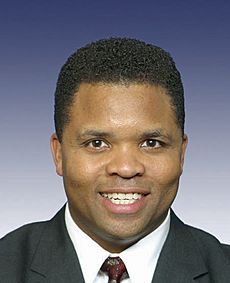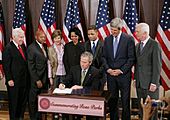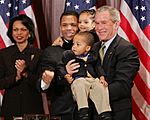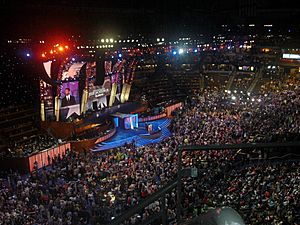Jesse Jackson Jr. facts for kids
Quick facts for kids
Jesse Jackson Jr.
|
|
|---|---|
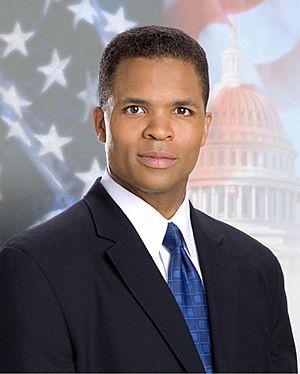
Official portrait, c. 2007
|
|
| Member of the U.S. House of Representatives from Illinois's 2nd district |
|
| In office December 12, 1995 – November 21, 2012 |
|
| Preceded by | Mel Reynolds |
| Succeeded by | Robin Kelly |
| Personal details | |
| Born |
Jesse Louis Jackson Jr.
March 11, 1965 Greenville, South Carolina, U.S. |
| Political party | Democratic |
| Spouse | |
| Children | 2 |
| Parents | Jesse Jackson (father) Jacqueline Brown (mother) |
| Relatives | Santita Jackson (sister) Jonathan Jackson (brother) |
| Education | North Carolina A&T State University (BS) Chicago Theological Seminary (MDiv) University of Illinois, Urbana-Champaign (JD) |
| Criminal details | |
| Criminal status | Released |
| Criminal charge | Conspiracy to Steal Campaign Funds – Title 18, U.S.C., Sec. 371 |
| Penalty | 30 months in federal prison |
Jesse Louis Jackson Jr. (born March 11, 1965) is an American former politician. He was a member of the United States House of Representatives for Illinois's 2nd district from 1995 until 2012. As a member of the Democratic Party, he followed in the footsteps of his famous father, the activist Jesse Jackson.
Before being elected, Jackson Jr. worked for his father's organization, Operation PUSH, which fights for social justice and civil rights. He was also a national co-chairman for Barack Obama's successful 2008 presidential campaign.
In 2012, Jackson's career in Congress ended. He resigned from his position due to health problems and a federal investigation. In 2013, he admitted to breaking federal campaign laws by using campaign money for personal items. He was sentenced to 30 months in federal prison and was released in 2015.
Contents
Early Life and Education
Jesse Jackson Jr. was born in Greenville, South Carolina, and grew up on the South Side of Chicago. He was one of five children of Jesse Jackson and Jacqueline Jackson. As a child, he sometimes traveled with his father to political meetings.
He and his brother Jonathan attended Le Mans Academy, a military boarding school in Indiana. Jackson later graduated from St. Albans School in Washington, D.C. In high school, he was a star running back on the football team.
For college, Jackson went to North Carolina A&T State University, the same school his father attended. He graduated with high honors in 1987. He then earned a master's degree from the Chicago Theological Seminary and a law degree from the University of Illinois College of Law in 1993.
Start of His Political Career
As a young man, Jackson helped his father with his civil rights work and his presidential campaigns in 1984 and 1988. He became known as a powerful speaker, just like his father.
In 1988, he became a member of the Democratic National Committee (DNC), which is the main organizing group for the Democratic Party. This role gave him experience working on many political campaigns.
Jackson was also a passionate activist. He was arrested for protesting against apartheid (a system of racial segregation) in South Africa. From 1993 to 1995, he was the national field director for the National Rainbow Coalition. In this role, he helped register millions of new voters and taught people about the importance of voting.
Serving in the U.S. House of Representatives
Getting Elected to Congress
In 1995, a seat opened up in the U.S. Congress for Illinois's 2nd district. This district includes parts of Chicago's South Side and nearby suburbs. Jackson decided to run for the seat.
He won the Democratic primary election with 48% of the vote. Since the district was strongly Democratic, he easily won the special election on December 12, 1995, with 76% of the vote. He took office three days later, promising to be a liberal voice in Congress. He was re-elected many times over the next 17 years.
Work in Congress
In Congress, Jackson was known for his excellent attendance and rarely missed a vote. He consistently voted for liberal policies, which focus on social programs and government support for citizens. He was a strong voice on issues of civil rights and economic fairness.
Jackson worked with members of both parties. He and Republican Henry Hyde worked together to support building a third major airport for the Chicago area. He also sponsored a bill to place a statue of civil rights hero Rosa Parks in the United States Capitol. President George W. Bush signed the bill into law in 2005.
He was a member of the powerful House Committee on Appropriations. This committee decides how the U.S. government spends its money.
Supporting Barack Obama
Jackson was an early and strong supporter of Barack Obama. He served as a national co-chairman for Obama's 2008 presidential campaign. He gave a major speech at the 2008 Democratic National Convention.
In his speech, he praised Obama's leadership and his ability to bring people together. He said, "I know Barack Obama. I've seen his leadership at work. I've seen the difference he has made in the lives of people across Illinois."
Leaving Congress
In June 2012, Jackson took a medical leave from Congress because of exhaustion. His office later announced that he was being treated for bipolar disorder, a type of mood disorder.
At the same time, he was being investigated for how he used his campaign funds. On November 21, 2012, Jackson resigned from Congress. He cited his health problems and the ongoing investigation as the reasons for his decision.
In February 2013, Jackson admitted that he had broken federal law by using about $750,000 in campaign money for personal purchases. He was sentenced to 30 months in federal prison and was released in March 2015.
Personal Life
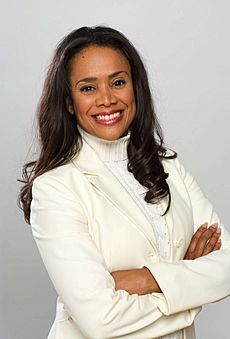
Jackson met his future wife, Sandi Stevens, during the 1988 presidential campaign. They married in 1991 and have two children, a son named Jesse III and a daughter named Jessica. The couple divorced in 2018.
His wife, Sandi, was also involved in politics. She served as an Alderman for Chicago's 7th ward from 2007 to 2013.
Jackson has written several books. One book, A More Perfect Union, outlines his political ideas. Another, It's About the Money, is a guide to help people manage their finances.
See also
- List of African-American United States representatives
- List of American federal politicians convicted of crimes
- List of federal political scandals in the United States
 | Madam C. J. Walker |
 | Janet Emerson Bashen |
 | Annie Turnbo Malone |
 | Maggie L. Walker |


